Since the launch of the National Shipbuilding Office in September 2021, the UK Government has announced £4.34 billion in shipbuilding contracts with £59.3 million of that going to shipyards overseas.
The information came to light after Kevan Jones, MP for North Durham, asked which contracts had been awarded to overseas firms since the National Shipbuilding Office was set up.
According to Alex Chalk, Minister of State at the Ministry of Defence, since the launch of the National Shipbuilding Office in September 2021, the UK Government has announced around £4.34 billion in shipbuilding contracts, with £4.28 billion going to UK companies and £59.3 million going to those based overseas:
- The table does not include Fleet Solid Ships as the contract has not been awarded, but as previously announced the Preferred Bidder is Team Resolute comprised of Navantia UK, Harland & Wolff and BMT.
- The table covers central Government shipbuilding and repair contracts and those of Arms Length Bodies in line with the National Shipbuilding Office’s review, and does not include local council contracts.
What about the Fleet Solid Support Ships?
Team Resolute, comprising BMT, Harland & Wolff and Navantia UK, has been appointed as the preferred bidder to deliver three crucial Fleet Solid Support ships to the Royal Fleet Auxiliary (RFA). The £1.6 billion contract to manufacture the vessels providing munitions, stores and provisions to the Royal Navy’s aircraft carriers, destroyers and frigates deployed at sea, is subject to HM Treasury and Ministerial approval.
The proposal pledges that the entire final assembly for all three ships will be completed at Harland & Wolff’s shipyard in Belfast. Under the contract, the majority of the blocks and modules for the ships would be constructed at Harland & Wolff’s facilities in Belfast and Appledore, with components to be manufactured in their other delivery centres in Methil and Arnish. Build work would also take place at Navantia’s shipyard in Cadiz in Spain, with around one-third of each ship being built in Spain.



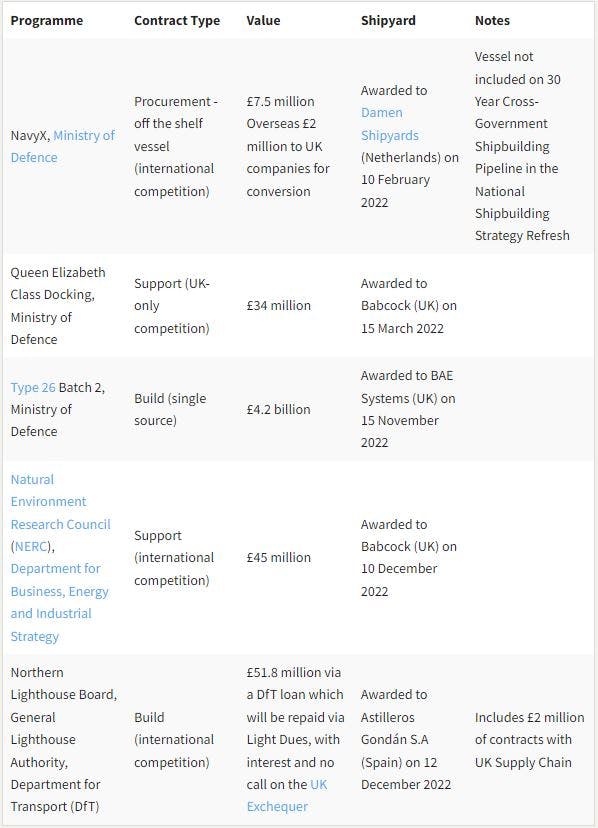


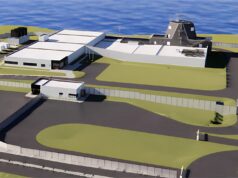
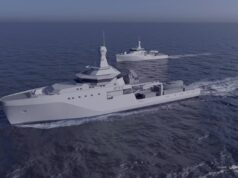
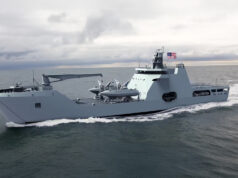
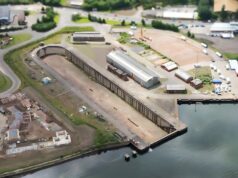
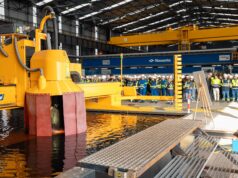


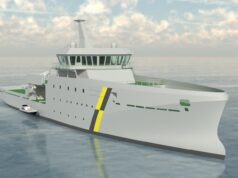

It’s a plan we haven’t had one of those for decades. It might even be a good one but it will need 20 years to transform from where we are to where we want to be. That’s why it needs to be endorsed by both the major parties at the next election. We should all be looking for it in their manifestos and if it isn’t there asking why. I don’t trust either of them but breaking a manifesto pledge at least increases the political embarrasment factor.
Very much agree.
My view is it will not be a focus at the next election with offshore energy being the replacement for complex warships and the government of the day arguing there’s a net gain.
I hope you’re wrong.
I hope I’m wrong to. But there’s some logic applied to the thinking. Big spending on the NHS is inevitable and commitments to energy to the tune to £28b mean something will need to be cut. And ultimately there’s claim 10s of thousands of green jobs will be created but there no flex in UK workforce to do this so logical area to look to is ship yards. Cutting orders saves money to reallocate and frees up the workforce to build offshore infrastructure.
We can do both. Wind turbines are not going to replace warship building.
Well not entirely replaced but where are the funds and 200k jobs going to come from. Logic dictates something has to give and applying historical lessons its usually defence.
Well North Sea oil and gas didn’t take over from defence, so it’s not going to happen with offshore wind, which is already a large industry in the UK, the largest in Europe in fact. New industry’s like renewables don’t simply take over from existing industry’s, especially defence.
I’m not saying take over from defence but has defence been sacrificed over decades yes, Do you really believe there can be what another 20b thrown at the NHS then another 28b thrown at off shore, probably more will be needed if big players pull investment. Its nothing to do with politics i don’t support labour or the tories, so its very simple for me logic and the numbers don’t stack up, Tories have yet put funding in for some programmes so once current funds run dry!!!. We also don’t have the employment problems of the 70s there’s simply not enough capacity in the labour force to create 200k skilled jobs. Unless they’re filled via migration which is no benefit to UK current population. Or we start to automated and improve processes reallocate workers from other industries. But that’s not going down to well atm.
I think you are over thinking it. These investments are spread over many many years, and most offshore wind money comes from the private companies that build wind farms and manufacturer wind turbines. I work for Orsted a world leading offshore wind farm builder. Wind farms are no longer subsidised by the government, because the costs have dropped dramatically to build these things. And the work force is a mix of new apprenticeships from school leavers , lots of ex Armed Force’s like myself. People who worked in oil and gas, and people from all sorts of different backgrounds who have retrained, and lots of university graduates. Recruitment is not a problem. And it doesn’t mean our ship yards or defence factory’s are going short. BAE Systems are recruiting thousands of apprentices. And offshore wind is a very multicultural industry. The vessel we hire have crews from all over the world. We have many skilled British workers in Taiwan, the US, Germany Denmark ect, and that’s a good thing, because we have the skills and much needed experience. 🇬🇧
Thanks Robert for those insights.
You are welcome Barry. ðŸ‘
You are aware the next government will create a national energy company and want to quadruple offshore wind by 2030. That’s not over years but 5 years from when they take power . That doesn’t include other renewables sectors like solar and tidal that will be expanded in the same time line. Sorry its just not possible in that time frame without reallocating funds and labour. Theres of course the likely hood political class have spoken without thinking. It will become clear once the party manifestos are published.
Labour has to win first. And national companies don’t just appear overnight. I’m trying to be polite, but emerging industries doesn’t mean defence is going to lose out. We have created many new industries over the decades. In fact the UK has led the way in many new industries, and certainly does with offshore wind, and now floating wind, and is making great strides with Hydrogen. People don’t like celebrating what we do well in this country, but believe me we do many things very well indeed. And countries around the globe look to us for experience and expertise. Yet at the same time many people still join our Armed Force’s, our defence sector us still one of the largest in the world, and we continue to build world class warships, and will do for many years into the future. Take my advice. Don’t lose any sleep over it. Enjoy Christmas 🎄.
I’ve been around long enough to see industries take beating to. Let me be clear I’d love to be wrong and in few years if you post an I told you so I’ll be happy. Merry Xmas.
Yes definitely. Large wind farms are classed as critical infrastructure.And plans are in place and exercises have also taken place. Radar has also been evaluated and installed on a offshore substation as turbines can affect radar coverage. Exercise took place with Norwegian F16s flying through the turbine lanes on Hornsea 01 which is around 100nm of the East Coast of Hornsea/Bridlington area. ðŸ‘
I’m not making a personal political point here David but we have to trust this government at least, otherwise we wouldn’t have got to where we are. We wait for the review, of course and hope for the best, but Labour and the Liberals?🙄
I think if you looked at those MP’s who take an interest in defence matters the great majority come from the Conservatives. It’s normally that side of the debate arguing for the armed forces. But when it comes to actions when in Govt I personally don’t see significant differences between them.
In my opinion dominating factor is currently out of our hands, being dependent upon those two well known supporters of NATO, Russia and China. Necessity will likely prove the political ‘muther of intention’. Even Germany is on the rise, at last.
In the meantime, blessed thanks to Ukraine for pointers to the way forward, poor bastards notwithstanding. That’ll get worse before it gets better, unless Putin and Lukashenko are put in a ‘box’ – latter first, likely.
Rgs
And a politically astute move to report the data before FSSS contract awarded. Ratio of foreign to domestic awards will change significantly.
1/3rd of the ships to be built in Spain. So basically 1 there and 2 here. I hadn’t realised it was so much. I wonder what bits the Spanish are doing. There are already 4 uk yards lined up for work.
Still this project has to get through the treasury and ministerial approval so it’s not a done deal yet.
I really hope if it makes it through the builders don’t F it up. Cost overruns and delays are a risk.
🤞ðŸ™ðŸ‘
Good to see a positive turn in UK shipbuilding but there is room for even more homemade products. I’m pleased to see Harland back in the frame what an asset that yard is to the UK and must be allowed to expand on the back of the three ship order. I’m looking forward to seeing the new frigates and logistic vessels in service at the end of this decade.
So this is recently placed orders you look at the inflight orders including subs it billions more. Most industries would love to have this level of government supports.
You mean long term government order book?
I agree a long order book creates a base for stable session making and investment.
Yes, there’s what, 1.5ish Type 26 to deliver from batch 1, 3.5ish dreadnoughts, 4.5ish T31s plus load of smaller life x and improvements etc to the current fleet in progress.
We now need yards (except Barrow) to turn these investments in orders. Relying on one customer (MoD) is a very bad idea for any business.
Good to see that government is also pushing companies to invest in their own facilities.
If they don’t improve facilities, then no chance of being competitive for foreign orders.
Same could be said about land and air orders, severe lack of investment of infrastructure and developing products unless gov funded. Just look how Rheinmetal has blossomed despite Germany not spending its dues on nato. Why was challenger not an export success in comparison to leopard, why did warrior not sell when it was darn good. Why did these companies not sell them worldwide and continue to develop them so that economies of scale then come into play
It is a different mentality.
UK companies are pushed for profits and dividend. German companies are pushed for organic growth and balance sheet value. German companies can borrow money cheaply, UK companies can’t.
There is also the over consolidation of the UK defence market to create a national champion. They got very lazy knowing that every MOD contract was theirs to loose. The got a wake up with MRA4, another wake up with AJAX and the very major wake up with T31. They are now awake and MOD is rightly saying if you don’t invest in improved productivity then forget it.
Part of the problem is that the USN shipyards are more inefficient and more unionised than the UK ones are these days. So price comparisons across the pond don’t mean much. T31 comparisons though are very telling.
I’m not sure what German economic crack you have been smoking but to say German companies “pushed for organic growth†not sure what that even means but your telling me companies like Rolls Royce or jaguar Land Rover is not poised for organic growth? The borrowing cost for British companies and German companies is the same depending on what currency they are borrowing in. The cost of British banks financing is significantly less than German banks in any currency.
As for German ship yards they produce very few export orders outside subrmaines and the vast majority those submarines are produced by foreign yards to German design. If that’s your basis of success then British shipyards are currently building 30 frigates for export.
As for the German submarines that they do export, many are for Israel the German government covers 50% or the procurement cost, is that what your advocating is paying to have foreign warships made here?
No disrespect to the Germans but to oriented that German companies like Siemens or VW are any different to British companies like RR or JLR is a nonsense.
Forgive me drawing a contrast.
By turnover Siemens are 6 times as big as Roll-Royce, and VW Group are 12 times as big as JLR.
And JLR are a subsidiary of an Indian company.
Though I’d describe German arms exports as “promiscuous”.
It was DE that sold quiet submarine engines to the Chinese, and (digging it up) was it not nuclear technology to Saddam Hussein?
They also iirc had the genius wheeze of selling corvettes to the Israelis, and then to the Egyptians a little later presumably to defend themselves against the ones just sold to Israel.
Somewhat mercantilist, in the Star Trek Universe perhaps DE would be in the Ferengi position !
Am I right in thinking the SNP controlled government of Scotland awarded the lighthouse ship contract to a Spanish company and due to the problems with Ferguson Marine an order for new ferries to Turkey?
The hypocrisy of endlessly complaining about what a raw deal Scotland gets (despite orders for 18 frigates at 2 sites either signed off or in the pipeline) but then awarding government contracts to any shipyard except an English one is beyond belief.
Maybe someone should point out that rebuilding skills and creating a long order book will stand a much better chance if all of the United Kingdom was on board and pulling in the same direction!
Not quite. The northern lighthouse board has responsibility for isle of man waters as well as Scotland. It’s funding is not from the taxpayer but duties paid from ports all over the UK. Ultimate responsibility lies with UK dept of transport. I’m not sure your assertion that the SNP are responsible for awarding this contract overseas stands up to scrutiny. I don’t like saying ” it’s all Westminsters fault” but in this case it may well be. And if that is the case it just makes a total mockery of the proposed national shipbuilding programme.
I’ve been puzzled why the UK never actually put together a decent industrial strategy for many years that has cross-party consent. I think it stems from critically bad management in the public and private sectors of the economy. I think we need much more focus on management skills and also reducing costs of administration and management in the UK. The technical people seems to be running lean on salaries for many years but admin and management seems to reap all the financial benefits…we have a very odd country.
We need to be realistic that a country with a high cost of labour and highly skilled population with a massive and world beating financial and business service sector will never be able to build anything other than warships for its own use. Warship export is not a major industry anywhere. Trying to build commercial ships in Britain is daft, it’s why we don’t do it and the few places that try to make a go of it even with higher end products like cruise ships are all going out of business or looking at massive government subsidies to keep “export ordersâ€.
If we are spending money to get warships built in the UK they should be for the Royal Navy and not subsidised builds for Israel or Egypt. Like the Germans French and Americans do. (Clearly Ukraine is a different case)
Our shipyards should be for domestic need only by the Royal Navy with the odd export factored in.
But you need competition otherwise we overpay everytime.
Damen in Holland still secure foreign orders and so does Mitsubishi industries of Japan. So it’s doable.
Lots of people get melancholy over UK past industries but the reality is we had a captive market and limited competition. Not sure we were ever a really competitive shipbuilding nation.
I see 2 elements to that.
1 – When they tried it UK Governments were absolutely cr*p at industrial strategy, from the destruction of the jet engine industry after WW2 to the cowardice of politicians in managements of nationalised industries when the TU Barons started kicking off.
Personally I think politicised trade unions owning one of the main political parties, and big business owning part of the other one has much to do with that.
There would be value in imposing non-political Trades Unions in the German model, and accept that there would be some screaming whilst we slaughter the sacred cow.
2 – I think it is difficult to have a large financial centre combined with long term industrial strategy.
The finance industry needs things to feed on, and the industrial sector is part of the feedstock to be eaten and digested and spat out again in a different order.
But it’s not only ships for “£59.3 million going to those based overseas”: https://www.edrmagazine.eu/plasan-signs-contract-with-bae-systems-for-type-26-armour “14 December 2022 – Plasan (Plasan Sasa Ltd. Israel) is very pleased to announce that they have signed a contract with BAE Systems, for the armouring of Type 26 Global Combat Ships for the UK Royal Navy – Batch 2. Plasan is currently delivering composite armour for the first three frigates as part of the Batch 1 contract.”
Wait. £4,340,000,000 awarded, of which £59,300,000 is going overseas. That’s right. Check the figures, the Foreign awards are just a tad SMALL compared with the overall figure, or am I wrong? Come on, get it right, it is piffling.
And certainly, from the military point of view, that’s nothing.
If the split construction gets Harland and Wolf back on its feet and thereby expands domestic ship building potential, so be it.
Time to thank George for all his sterling work and patience in bringing the news good and bad whatever. Season’s Greetings.
It’s a bit of a risk as what state is Harland and Wolff in and what kind of staff does it have now and how many will it have that have built a complex ship before?
Hopefully it all works out and the yard has everything it needs to start ship building.